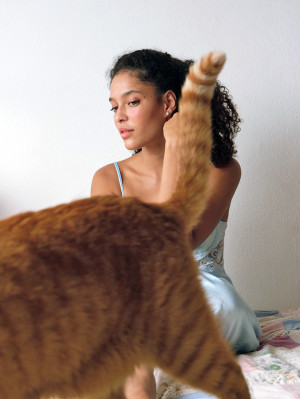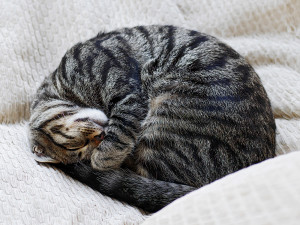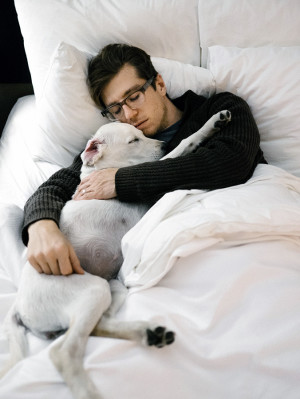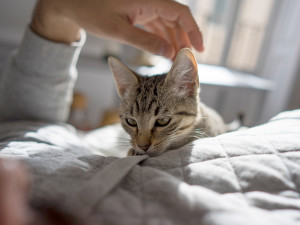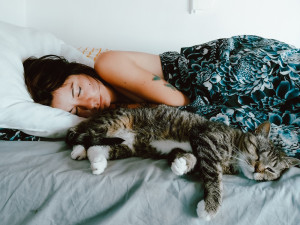Why Does My Cat Sleep at My Feet?
Other than the fact that they love you so very much.
In This Article:
What Does it Mean When a Cat Sleeps at Your Feet? Creating a Comfortable Sleeping Environment When to Be Concerned About Cat Sleep Positions
Our cats often like to sleep snuggled up with us in bed. Where they end up on the bed can be a source of comfort for us or have us tossing and turning. They may be pushing you off your own pillow, spooning in your arms, draped across your chest, burrowed in the crook of your knee, or (their favorite) at your feet.
When it comes down to it, the reasons for their sleeping preferences aren’t all that different from ours. Let’s talk about why that area near the end of the bed is the perfect, cozy sleeping spot for many cats.
What does it mean when a cat sleeps at your feet?
Just like there are many reasons you sleep in your chosen positions, your cat has lots of reasons they want to curl up at your feet.
How much do you spend on your pet per year?
Temperature control
A cat's ideal temperature is a bit warmer than ours. Their thermoneutral zone (the temperature at which they don’t have to use energy to heat up or cool off) is between approximately 86 degrees and 97 degrees Fahrenheit. For comparison, a human’s thermoneutral zone generally falls around 65 degrees to 86 degrees Fahrenheit, though there are differing opinions on this.
Because we often turn the heat down or AC up when we’re sleeping under our blankets, and our cats are usually not under the covers, they may get close to us for added warmth. Even the blankets and sheets they’re sleeping on top of can help them feel warmer or cooler.
Feeling secure
It’s no surprise that sleeping with us can help our cats feel secure. Think about how they sleep as kittens. It’s usually in a pile of many more kittens with tiny kitten feet sticking out in all directions — comfort in numbers. It’s instinctual. This also means they’re used to a lot of movement and rearranging as they sleep. So, it’s probably not that annoying to them when we move around and roll over.
Showing affection and trust
This ties back to feeling secure. If our cats trust us and enjoy our affection, they feel secure with us, whether awake or asleep. They can enjoy physical contact during sleep.
Marking territory
This probably isn’t the territory-marking you associate with animals who don’t want other animals in their area. When cats spend time in any one spot, they leave their scent behind. This can be a way of communicating with other cats and making themselves feel more secure being surrounded by their own scent.
When it comes to sleeping near your feet, scent marking happens naturally when they do it the first few times. Having their scent in that spot could encourage them to want to sleep there regularly and can let other pets know that spot is spoken for.
Physical comfort
Our beds are pretty comfy. That, alone, could prompt your cat to sleep there. Many cats also seem to enjoy leaning against something when they sleep. You may notice your cat wiggle as close to you as possible before they lay down as if to prop themselves up on your legs.
Does your cat like you best if they sleep next to you?
It’s hard not to take it personally when a cat chooses to sleep near one person and not another. Yes, it can certainly be a preference or closer bond with the person they sleep with. But some reasons have nothing to do with your bond.
You may move less than the other person, making sleeping with you more restful.
Your bed may be more comfortable.
The temperature in your room may fit your cat's needs better than in other rooms.
Maybe they want to be closer to, or farther from, other pets in the home who may or may not sleep near you.
Creating a comfortable sleeping environment
Cats are individuals and like different things when it comes to a cozy sleeping space. Whether you’re trying to get your cat to sleep with you or would prefer to lure them to a different sleeping spot, it may take some trial and error to see what your cat responds to.
Bedding type
Use their preferred sleeping spot as a starting point. Try to recreate where they’ve chosen to sleep. Then, improve on it. Your cat may like a squishy, fluffy bed or a more supportive, firm one. They may prefer a heated bed in cooler months and a cooling mat in warmer months. Some cats like to burrow under blankets or into hidey holes. Others want to stretch out long and feel the breeze. Test out some options and see how your cat responds.
Encouraging alternative sleeping spots (if feet sleeping is disruptive)
It’s common to need your cat to pick a different sleeping spot so you can get the sleep you need. Don’t feel bad about it. You’ll be a better cat parent with a good night’s sleep. But what happens when you move your cat, and they come right back? They need some encouragement.
Notice I said “encouragement” and not “punishment.” The best way to change a cat’s behavior is to reward them for doing what you want. Start by trying to replicate their preferred sleeping situation in your preferred spot. Then, reward them for using it. Day or night, pile on the rewards if they’re in the new sleeping area. It can be treats, pets, verbal praise, or whatever they love.
Don’t forcefully shove them out if they’re in the unwanted sleeping spot. Try neutrally removing them without making it a big deal or giving them lots of attention. Then, coax them to the preferred spot (in a positive way), and reward them for using it.
Orthopedic bedding (for arthritis or older cats)
Senior cats are prone to osteoarthritis. It’s incredibly common and comes with aches, pains, and mobility issues. You may notice your cat having a hard time getting comfortable or even getting in and out of their favorite sleeping spot or bed. Try out some other options.
There are orthopedic beds available that offer more support. Some are very low, so your cat doesn’t have to step or jump into them. Others have bolsters around the edges to support your cat from the side. You may want to add a heated cat pad for extra comfort. (Don't use a human heating pad. There are cat-specific heated beds that are safer for pets.) And don't forget about the way they get on the bed. Senior cats, or those with mobility issues, may need steps or ramps to make it up to the bed.
When to be concerned about cat sleep positions
Your cat will change their sleeping preferences, just like you do. I notice it most when the weather changes. They may suddenly want more or less space between you. They may move to a different spot on the bed. They could even leave the bed altogether and start spending some or all of the night in another room. This isn’t cause for concern unless you notice other changes to their normal behavior or their sleeping preferences seem unnatural.
For example:
If your cat suddenly can’t get comfortable
If your cat doesn’t seem like they can sleep as well or as long as they used to
If they suddenly have a tense or aggressive reaction when they’re sleeping close to you and you move
If they start sleeping someplace strange, like under the couch or behind furniture they’ve never shown an interest in before
If you notice other changes to their normal behavior, like eating or litter box habits, play and energy levels, not wanting to be handled
These subtle changes could be a sign of something more serious, like a medical issue or fear and anxiety. Talk with your veterinarian right away.
FAQs (People also ask):
Is my cat cold when they sleep?
Your cat could be cold if the temperature in the room drops considerably overnight or falls well below their thermoneutral zone low of about 86 degrees Fahrenheit. Watch for clues, like your cat getting as close to you as possible or sleeping in a tight ball. They may try to get under the covers.
Why does my cat sleep on me?
Your cat may be sleeping on you instead of near you for many of the same reasons cats like to sleep near our feet. Comfort, temperature, bonding, security, etc., are just as relevant for any of your cat’s sleeping choices.
Do cats protect you while you sleep?
While it’s certainly possible your cat could have a protective response if you’re in danger at night or any other time, it’s not common. Danger from a person’s perspective is very different than danger from a cat’s perspective. You may see your cat reacting if something makes them feel less than secure, like a loud noise or sudden movement.


